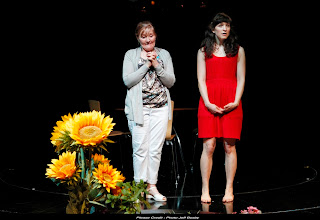Little Match Girl by Meow Meow
Produced by Malthouse Theatre &Meow Meow Revolution
Merlyn Theatre, Malthouse, Nov 16 to December 4, 2011
Reviewed by: Kate Herbert on November 16, 2011
Stars: ****1/2
Published in Herald Sun on Nov 18, 2011
Meow Meow & Mitchell Butel in Little Match Girl. Photo by Jeff Busby
Meow Meow is a delicious blendino of demented cabaret artiste, dissolute whore and wayward child who grabs the audience like a fistful of putty and moulds us into whatever she wants. We are her playthings and she is our mistress.
Although this Christmas festa is called Little Match Girl, it is not a recreation or even a deconstruction of the Hans Christian Andersen tale.
Rather, it is a collection of images, songs and allusions inspired by the dark fairy tale about the hungry, shoeless child who dies of exposure when trying to sell matches on a snowy, New Year’s Eve.
Meow Meow’s voice seduces with its rich, dark chocolate tones and occasional touch of bitterness. She shocks and taunts us, ripping cabaret apart with her pearly teeth then rams the pieces together in a totally new form.
Wearing a blood-red, sequined gown and draped over a half-clothed man, she purrs a sultry rendition of Cole Porter’s It’s Too Darn Hot that is so steamy it explodes the lighting, leaving us in the dark at the mercy of the prowling Meow Meow.
She strikes matches to light her face, titillates the crowd in the dark, climbs over us, snatches mobiles phones, soothes us with a music box lullaby then abruptly barks orders like a commandant.
Audience members are press-ganged into lighting her with torches, riding a bike to generate electricity or rubbing her all over to power the revolve and they do it with a smile of awe and adoration.
Directed by Marion Potts and accompanied by Iain Grandage and the band, she sings a collection of smoky, poignant songs that are peppered with rambling soliloquies, ironic quips and casual references to poverty or homelessness.
What follows is the ultimate dream sequence. The inimitable Mitchell Butel, who is disguised initially as an audient, makes an impressive, dazzling entrance singing Wagner’s O Du, Mein Holder Abendstern (‘Oh, you, my fair evening star’) and dragging cascades of enormous string lights.
The pair sings the perky Eurovision 1965 hit, Poupée de Cire, Poupée de Son (Wax Doll, Sawdust Doll) then wow us with Noel Coward’s witty, playful What’s Going to Happen to the Tots.
Meow Meow, now dressed like the wax doll in a tutu, flies upwards into the huge chandelier while singing Tear Down The Stars only to come tumbling back to earth when the dream evaporates to sing Laurie Anderson’s The Dream Before.
Her performance is provocative, impassioned, vulnerable and idiosyncratic. It resonates with 1930s German cabaret or modern burlesque, nightclub singers, political comedians, deconstructed theatre and contemporary performance art.
Anna Cordingley’s design is vividly evocative and Paul Jackson’s lighting is atmospheric and essential to the fabric of the show.
The more I think about this show, the more I love it. Don’t sit on the aisle or carry a torch. Meow Meow will eat you for supper.
By Kate Herbert
Created & performed by Meow Meow & Iain Grandage
Featuring Mitchell Butel
Director: Marion Potts
Music Director, Composition & Music Arrangement: Iain Grandage
Additional Material: Mitchell Butel
Set & Costume: Anna Cordingley
Lighting: Paul Jackson
Sound System Designer: Chris Leary
Musicians: Iain Grandage, Stephen Fitzgerald, Benjamin Hauptmann, Xani Kolac






